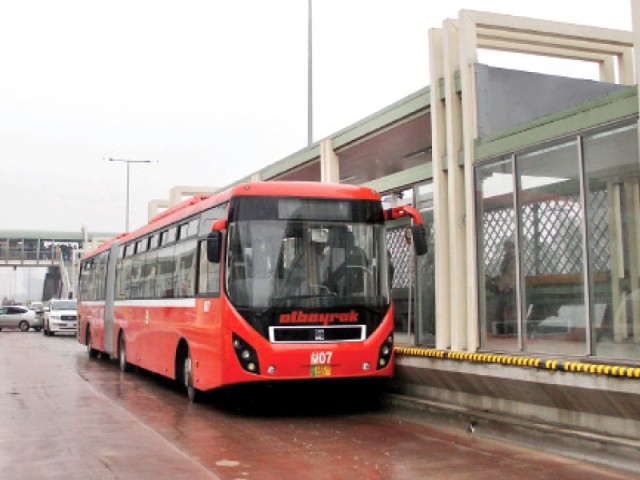
While the bus service is slated to start this month, the government has yet to finalise whether the Punjab Mass Transit Authority or the Punjab Safe Cities Authority should install surveillance cameras on its routes.
“As soon as the authorities resolve the issue of installing cameras and setting up bus shelters, the company would start operations on 14 feeder bus routes of Lahore metro bus service,” said a spokesperson for Daewoo Pakistan, which has the contract for the service.
He hoped the new buses would start plying by mid-January, adding the company was still training the newly inducted drivers for the service.
Punjab Mass Transit Authority (PMA) Director Operations Uzair Shah said the department was already using CCTV cameras and a dozen other technologies to maintain efficient metro bus operations in Lahore and Rawalpindi.
The authority has been using surveillance camera to monitor passengers, public buses and traffic along the route while the Safe Cities Authority has installed more cameras to make Lahore a secure place.
However, the government believes the PSCA has acquired state-of-the-art surveillance technology and it should be used for other purposes as well to reduce capital and operational expenditures.
Uzair said both authorities were in the process of deliberations and hopefully the issue would be settled in a forthcoming meeting scheduled at the Planning and Development (P&D) Department this week.
The feeder buses will initially run on 14 routes, covering a total length of 123 kilometres. More buses are likely to be inducted in a phased manner once the Metro Train’s Orange Line is operational.
The PMA expects a significant decrease in motorcycle travellers and air pollution in Lahore with the launch of feeder buses as connectivity will considerably improve in different areas along the metro bus track.

The authority has already made arrangements to integrate ticketing systems of both the Lahore Metro Bus Service and feeder buses that will enable passengers to travel on a single ticket on both buses.
Uzair said the PMA wanted to provide reliable and comfortable public transport facility to all citizens within a 500-metre radius from their workplace or residence.
The PMA had inked an agreement with Daewoo in February for procurement, operation and maintenance of 200 feeder buses for integrated bus operations in Lahore. The buses were to hit the roads in April but the project was delayed owing to disagreements between the PMA and the operator on contract terms.
The issue was, however, resolved amicably and the operator ordered new buses. Daewoo Pakistan has invested Rs3 billion in the procurement of 200 new buses, including 162 large and 38 small buses. The automaker also plans to expand its fleet at a later stage.
The contractor would own and operate these buses and bill the PMA on per kilometre basis. The authority will pay Rs165 and Rs140 per kilometre for large and small buses, respectively. Initially, approximately 200,000 passengers would benefit daily from the new buses as each bus can transport 1,000 passengers per day.
Official documents indicate these buses will be equipped with automated fare collection and bus scheduling system and GPS tracking devices. The operator will set up card (ticket) sale and recharge points at 22 spots on the feeder routes as specified by the authority that will remain open during bus operation time – tentatively decided as 18 hours a day.
The operator will also provide 15 handheld electronic ticket validating devices for spot checking to facilitate PMA-assigned ticket inspectors.
Documents show the agreement has been signed for six years, which can be extended with mutual consent on compliance of the contract terms. The authority plans to run as many as 1,400 standard or minibuses on 104 routes with a route length of 951 kilometres.
Published in The Express Tribune, January 9th, 2017.



1723032398-0/BeFunky-collage-(36)1723032398-0-165x106.webp)













COMMENTS
Comments are moderated and generally will be posted if they are on-topic and not abusive.
For more information, please see our Comments FAQ